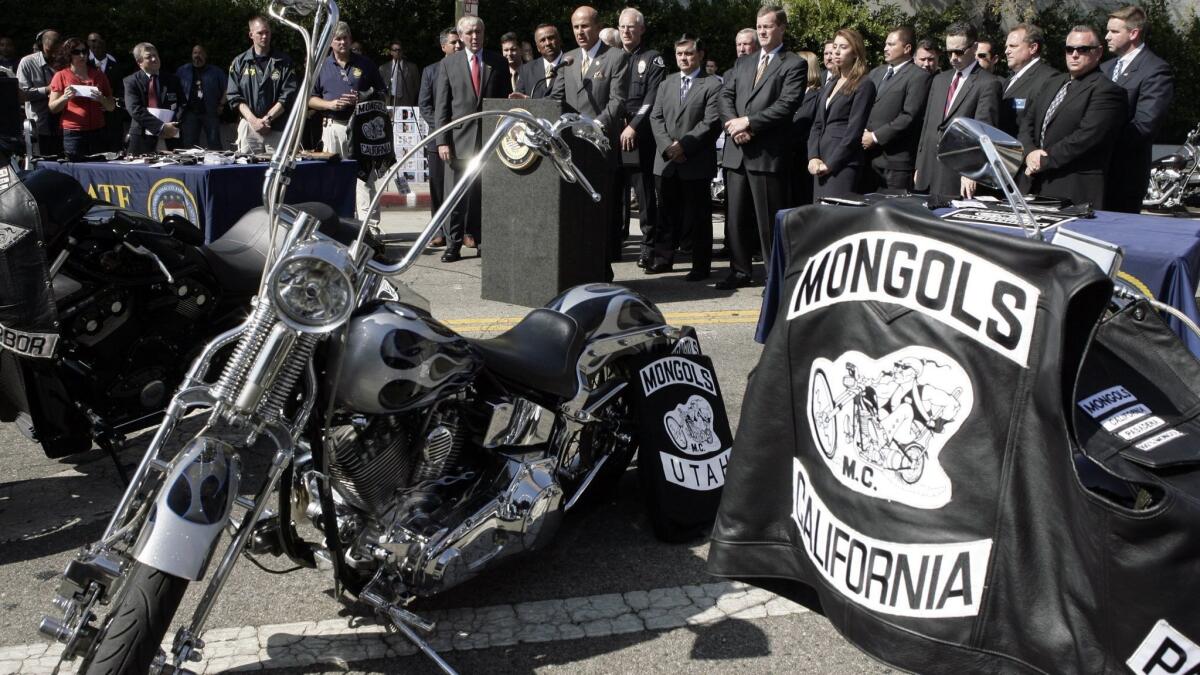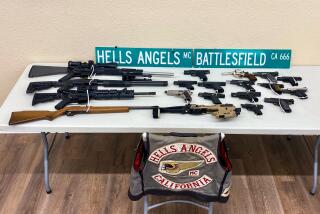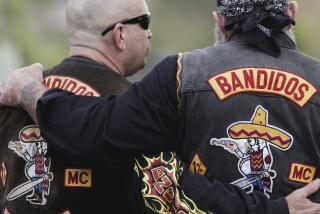Mongols biker gang found guilty in racketeering case, moving government closer to seizing trademark

A jury found the Mongols motorcycle club guilty in a federal racketeering case, a verdict that moves the U.S. government a step closer to its goal of seizing the gangâs trademarked insignia.
The jury reached its decision Thursday after deliberating for six days over evidence heard in a monthlong trial in a Santa Ana courtroom. In finding the Mongol Nation, a group of the gangâs leaders, guilty of racketeering and conspiracy to commit racketeering, jurors found the club itself shares responsibility for several violent crimes and drug-dealing crimes committed by members.
With the victory, prosecutors will turn their attention to their plans to strip the gang of the trademarks it owns for its coveted insignia â a Genghis Khan-like figure riding a motorcycle beneath the Mongol name. The image, which members are allowed to wear emblazoned on their riding jackets, patches and elsewhere, is a crucial part of the gangâs identity in the insular culture of motorcycle clubs.
At a hearing scheduled for Jan. 8, jurors will be asked to decide whether the insignia is linked closely enough to the racketeering charges that the trademarks should be forfeited as part of the sentence against the group.
It is a prize the government has been trying to claim for years in the belief that controlling the trademark will give authorities the power to bar members from wearing the image and, in doing so, weaken the gangâs status.
Whether the untested legal strategy would work, however, is debatable as trademark experts questioned whether simply owning a trademark would grant the government the authority it seeks to prevent people from wearing a piece of contested clothing.
Joe Yanny, an attorney for the Mongols, said he will ask U.S. District Judge David O. Carter to set aside the verdict and reiterated plans to challenge the governmentâs efforts to take the trademark.
âThis thing is far from over,â Yanny said. âYou canât hold an entire organization liable just because of the actions of a few people who happened to be members of the organization.â
A spokesperson for the U.S. attorneyâs office declined to comment, citing the ongoing proceedings.
But Thursday, even before the verdict was announced, prosecutors made clear their intention to press ahead with plans to seize the trademark. They filed in court a form they want Carter to give the jury when it decides on whether control of the insignia, as well as clothing and weapons already seized from Mongols members, should be forfeited.
The document asks the jury to grant the government sweeping control over âany and all legal and equitable rights of any kind or nature associatedâ with the trademarked images.
The Mongols were formed in the 1970s in Montebello, outside Los Angeles, by a group of Latino men who reportedly had been rejected for membership by the Hells Angels motorcycle gang. It has expanded over the decades to include several hundred members in chapters across Southern California and elsewhere.
The club has been in the federal governmentâs crosshairs for years, along with several other groups authorities have identified as âoutlaw motorcycle gangs.â Despite their claims of being innocent social clubs, the groups, which include the Hells Angels, Vagos and the Outlaws, have long track records of warring with each other and, according to authorities, operate as criminal organizations that subsist on the drug trade.
In 2008, nearly 80 Mongols members were charged in a sweeping racketeering case that included an array of alleged murders, assaults and drug deals. The charges were the culmination of Operation Black Rain, an investigation that centered on Mongols who had become paid informants, as well as four undercover agents from the Bureau of Alcohol, Tobacco, Firearms and Explosives who infiltrated the clubâs ranks.
The idea of stripping the Mongols of their insignia originated in this earlier case. At a news conference announcing the charges, then-U.S. Atty. Thomas P. OâBrien laid out plans to take control of the trademark.
âWeâre going after their very identity,â OâBrien said.
All but two of the defendants in that case pleaded guilty. A judge agreed the trademark should be forfeited as part of the sentences handed down, but he ultimately reversed himself after deciding none of the individuals charged in the case actually owned the trademark and therefore couldnât forfeit it.
Prosecutors tried again in 2013, when they filed a second racketeering case that was largely the same as the first but named only one defendant â Mongol Nation, the entity that prosecutors say is made up of the clubâs leaders and owns the trademark.
Twitter: @joelrubin
More to Read
Sign up for Essential California
The most important California stories and recommendations in your inbox every morning.
You may occasionally receive promotional content from the Los Angeles Times.











